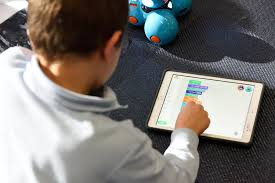How can video games help children learn? Instead, games that put authentic learning first focus on deeper concepts, exploration and experimentation, and developing a sense of accomplishment by building skills and applying them to real-world contexts by: Spending time on playing and figuring things out for themselves, rather than instruction or explanation.
What age should a child start playing video games? But generally, for kids between two to five years, the recommendation is just one hour of “high quality” media (including video games) a day with side-by-side supervision. “Over the age of six, it’s very open,” she says.
Are video games good for learning? However, the benefits of videogames include improved powers of concentration, creativity, memory, languages and teamwork. Videogames can make it easier to learn educational contents and develop cognitive skills.
What life skills can video games teach kids?
So, here are the life skills that you can learn from playing video games.
- Patience. Old arcade games forced you to suffer through tons of repetitive gameplay to see how far you could go.
- Strategic Planning.
- Socialization.
- Mental Prowess.
- Empathy.
- Literacy.
- Hand-Eye Coordination.
- Observation.
How can video games help children learn? – Additional Questions
What are the benefits of video games?
The most notable positive effects of gaming include:
- Improved cognitive abilities.
- Improved problem-solving skills and logic.
- Increased hand-to-eye coordination.
- Greater multi-tasking ability.
- Faster and more accurate decision-making.
- Enhanced prosocial behaviors.
- Better eyesight (attention to detail)
What are the benefits of playing games?
Benefits of video games for both children and adults include: Healthy brain stimulation. Development of problem-solving skills. Stress relief.
What life skills can video games teach?
Valuable Skills Developed Through Video Games
- Risk-Taking.
- Patience and Perseverance.
- Problem-Solving.
- Strategizing.
- Concentration.
- Leadership.
- Social Skills.
- Critical Thinking.
Do video games help with life skills?
Playing video games has shown to develop problem-solving, spatial and hand-eye coordination skills, as well as vision and speed skills amongst people. Sinha says, “People who play role-playing and strategic-based games show increased problem-solving skills, while puzzle games can teach gamers organisation skills.
What life lessons have video games taught you?
10 Life Lessons Millennials Learned From Video Games (That Older Generations Don’t Understand)
- Overcoming Challenges.
- Goal Setting.
- Habits (Daily Quests).
- Responsibility (Guild).
- Leadership (Team and Guild).
- Process Versus Reward.
- “What’s in a Title?”
- Healthy Competition.
What video games can teach us?
Games nurture optimism and create positive emotions. Gaming teaches players how to deal with frustration and anxiety. Gaming promotes social skills; more than 70 per cent of gamers play, either competitively or co-operatively, with a friend. Games are being used to treat certain medical and mental health conditions.
Do kids learn better with games?
According to research, using games in teaching can help increase student participation, foster social and emotional learning, and motivate students to take risks. One study of the popular multiple-choice quiz game Kahoot found that it improved students’ attitudes toward learning and boosted their academic scores.
Why are video games good for students?
Some games might improve kids’ hand–eye coordination and problem-solving skills. Video games that require kids to move or manipulate the game through their own physical movement can get sedentary kids moving — but not as much as if they actually played outside or did sports.
Why is playing important for a child?
Play improves the cognitive, physical, social, and emotional well-being of children and young people. Through play, children learn about the world and themselves. They also learn skills they need for study, work and relationships such as: confidence.
What are 5 benefits of play?
Why is Play Important for Children?
- Play Builds Imagination and Creativity. During play, kids stretch their imaginations.
- Play Fosters Cognitive Growth.
- Play Delivers Emotional and Behavioural Benefits.
- Play Improves Literacy.
- Play Encourages Greater Independence.
- Play Promotes Physical Fitness.
Which is the most important need of a child?
The eight things kids need to thrive
- Security. Kids must feel safe and sound, with their basic survival needs met: shelter, food, clothing, medical care and protection from harm.
- Stability. Stability comes from family and community.
- Consistency.
- Emotional support.
- Love.
- Education.
- Positive role models.
- Structure.
How do children learn?
How children and teenagers learn. Children and teenagers learn by observing, listening, exploring, experimenting and asking questions. Being interested, motivated and engaged in learning is important for children once they start school. It can also help if they understand why they’re learning something.
How do little children learn best?
Your child learns best by actively engaging with their environment. This includes: observing things, watching faces and responding to voices. listening to sounds, making sounds and singing.
What ways do kids learn the best?
They learn best when they are trying to make sense of things or do something that’s almost too difficult for them. (Vygotsky) This is often helped, by having just enough adult support – what Bruner called scaffolding. Knowing when to sensitively withdraw the support leads to independence.
How can I help my child learn?
Simple Ways to Encourage Learning
- Let your child know you believe in him or her. Tell your child often that you believe in him or her.
- Talk, sing, and read with your child.
- Involve your extended family.
- Limit your child’s TV watching.
- Have a positive attitude toward school and learning.
- Make sure your child does homework.
How can I make my child smart and intelligent?
10 Secrets on How to Raise Smart Kids
- Read to Them Early and Often.
- Make Time for Unstructured Play.
- Let Your Child Make Mistakes.
- Get Them Moving!
- Eat Dinner Together.
- Establish a Good Bedtime Routine.
- Give Them Chores.
- Exercise Their Brain.
Why is my child not learning?
Kids may struggle with learning for several reasons. Some might have difficulty with reading or math. Some have trouble processing instructions. Others have trouble organizing their thoughts and the steps it takes to get homework done.




